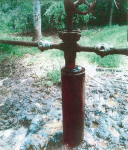- Like
- Digg
- Del
- Tumblr
- VKontakte
- Buffer
- Love This
- Odnoklassniki
- Meneame
- Blogger
- Amazon
- Yahoo Mail
- Gmail
- AOL
- Newsvine
- HackerNews
- Evernote
- MySpace
- Mail.ru
- Viadeo
- Line
- Comments
- Yummly
- SMS
- Viber
- Telegram
- Subscribe
- Skype
- Facebook Messenger
- Kakao
- LiveJournal
- Yammer
- Edgar
- Fintel
- Mix
- Instapaper
- Copy Link
COMMENTARY: What changes will gas bring? We’ll know only in time
James B. Kilgore
The gas leasing frenzy has ratcheted up another notch in northern Wayne County.
Chesapeake Energy has just doubled its signing bonus offer from $750 per acre to $1,500 per acre and increased its royalty offer from 12½ to 15 percent. The new offer, which apparently also extends to some areas outside of Wayne County, was put in the hands of land contractors, called landmen, in early March.
This is the highest ever signing bonus offer to drill for natural gas in Pennsylvania, where in Wayne County until recent months land was leased for as low as $25 per acre.
Since late last year Chesapeake has offered leases for $750 per acre for a six- to 10-year lease at 12½ percent royalty. Then in early March Chesapeake upped the lease ante with a $1,250 per acre signing bonus with a 15 percent royalty for a seven-year primary term lease with a seven-year renewal, essentially a very long 14-year lease. Shortly thereafter landmen from Long Consulting, an independent leasing agent for Chesapeake, indicated that there was an “error” in the new offer and that the correct price was $1,500 per acre.
Other energy companies in the market have, for the most part, been leasing at bonus offers lower than Chesapeake with the standard 12½ percent royalty. One small company, Whitmar Exploration, has in a selected area offered a higher royalty.
”Chesapeake is trying to scare off the competition,” says a representative of a competing company who wants to remain anonymous. Others say that Chesapeake has upped the ante to break up landowner groups trying to bid out acreage as a block. Chesapeake is hoping some of those bid group members will peel off and sign. In addition some say that Chesapeake wants to grab as much land as possible prior to the drilling of test wells later this year in northern Wayne since if such wells show promise that will drive the lease prices even higher.
Some are encouraging landowners to hold out and not bid their acreage now in hopes that the lease offers will go higher still as they have in other markets as drilling commences and wells are proved productive. But Wayne County test wells could prove disappointing, in which case lease offers could decline or evaporate. Under that scenario one would sign a lease before drilling commences but push for a short lease so that if no drilling occurs on his property the landowner can re-lease under then-current market terms.
Many landowners have pressing financial needs and cannot afford to wait out the end game of the current leasing frenzy. Those landowners can work with currently active gas lease bid groups to get the best economic package now.
Still other landowners and some nonlandowners want nothing to do with gas leasing. They do not want the land disturbed — period. Some of those individuals feel the environmental impact of gas production and the changes to the peaceful, rural life of Wayne County should be avoided. These caring landowners and nonlandowners should be heard.
Many who will lease their lands for gas exploration and those that will not feel uneasy and upset by the current leasing process. Many feel that the landowners that were encouraged by landmen to lease for $25 per acre or even more were cheated by the landmen and energy companies. The whole leasing process is very unsettling. But even landowners who leased at $25 per acre have the chance of gaining some significant income if a gas well is drilled on or near their property.
None of the standard energy company leases are “landowner friendly” and landowners are encouraged to seek professional advice before considering a lease. Several gas bid groups in the area are providing that professional advice as part of the bid process.
Energy companies in the latest round of leasing activity entered Wayne County about a year ago leasing in and around the Mount Pleasant and Preston Township areas. Those first companies, all of which are still leasing, include Southwestern Energy, Stone Energy and Whitmar Exploration. New entrants are reportedly now leasing in the market – Exco Resources recently began leasing in Cherry Ridge Township. Other companies are poised to enter.
These companies, for the most part, are targeting the Marcellus shale formation, which in northern Wayne County is estimated to be 150 to 200 feet thick at a depth of just over 4,000 feet below sea level or about a mile below the surface, assuming a surface elevation of about 1,000 feet. This shale formation contains natural gas from carbon-rich organic material from ancient sea or river life forms that decomposed millions of years ago. In many Marcellus shale formations significant quantities of gas can be extracted through new drilling and rock fracturing technology. Higher energy prices make the extraction of gas from the Marcellus formation a profitable venture.
In October Chesapeake Energy, a large and respected natural gas exploration company, entered the market, first offering a $250 per acre signing bonus for a 10-year lease with a 12½ percent royalty. Within days the offer was increased to $300 per acre and quickly jumped to $500. Late last year a gas bid group in Starrucca representing about 12,000 acres negotiated a $750 signing bonus from Chesapeake for a six-year lease with 12½ royalty. That price held until early March when the new pricing was announced.
Where will it go from here? In other shale plays in Texas, Arkansas and elsewhere the lease offers started out low and ratcheted up significantly as leasing activity progressed. As test wells proved productive lease offers rose and after several years the signing bonus offers rose to the $15,000 per acre range for very short leases with royalties as high as 25 percent and perhaps higher.
Will past experience play out in Wayne County? We will only know the answer some years in the future. If the natural gas is below us as the energy companies presume, then Wayne County will see big changes ahead – some good and some not so good.












